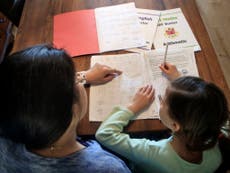‘My entire life changed overnight’: The women radically overhauling their careers during the Covid crisis
‘There was a lot of time for self-reflection. You think, what are you doing with your life?’ says one

Your support helps us to tell the story
From reproductive rights to climate change to Big Tech, The Independent is on the ground when the story is developing. Whether it's investigating the financials of Elon Musk's pro-Trump PAC or producing our latest documentary, 'The A Word', which shines a light on the American women fighting for reproductive rights, we know how important it is to parse out the facts from the messaging.
At such a critical moment in US history, we need reporters on the ground. Your donation allows us to keep sending journalists to speak to both sides of the story.
The Independent is trusted by Americans across the entire political spectrum. And unlike many other quality news outlets, we choose not to lock Americans out of our reporting and analysis with paywalls. We believe quality journalism should be available to everyone, paid for by those who can afford it.
Your support makes all the difference.Retail, hospitality, leisure, tourism and the arts have all been irrevocably damaged by the coronavirus crisis – with women bearing the brunt of the upheaval because they are over-represented in these sectors.
But while studies have shown that women have been more likely to lose jobs in the public health emergency, some have used the economic chaos unleashed by the virus to kickstart a new career path.
A study carried out by AllBright, a professional women’s network, found that 61 per cent of their female members were considering a career change, while one in four were contemplating starting their own business.
Rhiannon Waite is one such woman. The 28-year-old, who lives in Northumberland, was forced to pack up her life in Dubai and return to the UK after losing her job as a flight attendant for Emirates airline when the travel industry collapsed in the wake of the pandemic.
“Flying hours were significantly reduced when lockdown was declared in March,” Ms Waite tells The Independent. “I was furloughed before losing my job in mid-July. I was gutted and disheartened because I was going to have to move back to the UK. It was daunting, as my entire life changed overnight.”
She has now moved into food and catering and makes graze boxes for special events like birthdays and weddings. She explains that her career change was sparked by suddenly having spare time on her hands.
“I basically do fancy buffets which are presented in a pretty way with flower arrangements,” she adds. “I started doing it in lockdown to make friend’s birthdays more special but now it is a full-blown business. It is for anyone who wants to have a nice night in lockdown or for special occasions. If coronavirus hadn’t happened, I wouldn’t have explored this at all.”
Ms Waite, whose business is called House of Boards, said she was happier in her career now because she has more freedom and is doing something that can “grow bigger and bigger”.
Amber Honey has also overhauled her career during the public health crisis, taking a hefty pay cut in the process. The 31-year-old, who is originally from South Africa, moved from being an accountant at Deloitte to working on the finance team at a charity to now working as a teaching assistant at a secondary school in south London.
“During the crisis, I was working from home and it felt like there was no human interaction in my job,” the 31-year-old, who has been living in London for almost a decade, says. “It was cut-throat at Deloitte. I was stressed. Now my job doesn’t feel like work. It feels wonderful to get up in the morning and come here. The energy of the children is amazing. They are so funny and witty.”
Ms Honey said she took a massive pay cut both from Deloitte and the charity she worked at to go into teaching, saying she was making about £60,000 a year at Deloitte but only earns about £20,000 now.
“During the first couple of months of the lockdown and working from home, there was a lot of time for self-reflection,” Ms Honey, who supports children with learning difficulties and special needs, adds. “You think, what are you doing with your life? Being around children all day puts life into perspective.”
Gemma Parry, who lives in Swansea, has also taken a leap of faith to move from journalism and PR to start working as a mental health nurse.
“The pandemic has been a living nightmare at times,” the 28-year-old, who previously worked for BBC Wales, says. “People in my social circle – young and old – have died from Covid. It has been the most life-changing thing to have happened to much of society. There are going to be consequences from it. I want to do all I can to help people.”
Ms Parry is due to start training as a mental health nurse in the next few months and has handed in her notice at her current job. She said it was partly her own mental health issues that had ignited her desire to move into the sector.
“I want to help with people like me,” she adds. “I was diagnosed with depression and anxiety and more recently diagnosed with a very mild form of borderline personality disorder,” Ms Parry adds. “A couple of years ago, I was signed off with mental health issues. I couldn’t leave the house; I was so unwell. But now I want to do some good and help people – to make people realise things get easier and do get better.”
Ms Parry said she had grappled with her own mental health during the pandemic.
“It has been really horrible at times,” she adds. “This pandemic is going to have an impact on our mental health for many years to come. There is unprocessed grief as we can’t come together with our families and remember people the way they want to be remembered when they die. And those of us who haven’t died have lost a year of our lives.”
Meryem Hartshorn, who is from Newcastle, also had her life turned upside down when the Covid crisis hit. She has gone from being surrounded by late-night revellers at a nightclub to being surrounded by flowers in her new job as a florist.
The 29-year-old was pushed on to universal credit after losing her job when the nightclub she had worked in for four years closed when the first lockdown was declared in March.
“I was serving tables with bottles, greeting guests, and promoting nights,” she says. “I was self-employed so I got the self-employment support grant but I also went on to universal credit. I was stuck in a rut. I felt anxious. I had savings so I didn’t struggle to afford food, but I didn’t save up my whole life to spend my savings on unemployment.”
Ms Hartshorn said she didn’t want to “sit around” waiting for the nightlife industry to reopen so decided to retrain in floristry – something she had been thinking about for a couple of years but had never had the spare time to actually embark on.
“Coronavirus forced me into having loads of free time,” Ms Hartshorn, who started a floristry course in September, adds. “I do miss the atmosphere and the buzz of being inside a club and the socialising, but I’m enjoying floristry. There is a sense of achievement as you have an end product you can be proud of. Floristry is therapeutic.”
Ms Hartshorn, whose floristry business is called The Stem Bar, said she also enjoys the fact she can now work from home – explaining that it makes looking after her daughter much easier than it was when she was working nights in the club.
“The pandemic forced me to reconsider my options and my path,” Ms Hartshorn adds. “Lots of my female friends work in nightlife and were also out of work and this helped spur me into action. Everyone was anxious. Some of my female friends are still out of work.”




Join our commenting forum
Join thought-provoking conversations, follow other Independent readers and see their replies
Comments